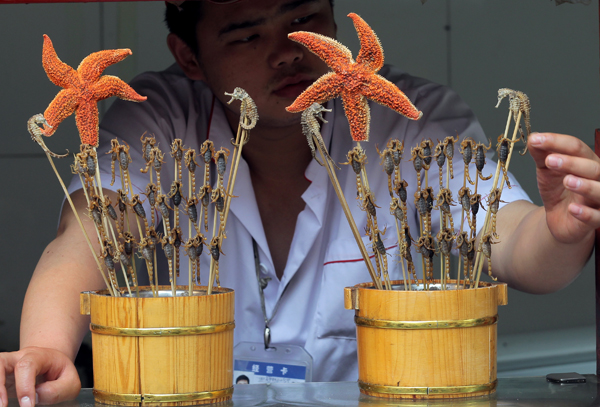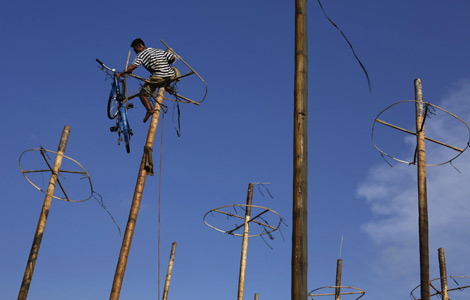A southern staple
Updated: 2013-10-04 09:49
By Li Wenfang in Guangzhou (China Daily)
|
|||||||||||
Eating bugs might disgust most consumers around the world, but not in Guangdong province
In a research report released earlier this year, the United Nations Food and Agricultural Organization said eating insects could help end food shortages across the world. In fact, it urged people to eat them as a nutritious supplement.
And while that might be news - and perhaps disgusting - to some, southern Chinese people have long known that bugs, whether crunchy or squishy, big or small, are not only tasty and filling, but great sources of nutrients.
Insects are a delicacy for many southern Chinese people, especially in Guangdong province, where they have a saying that "there are no four-legged things that they don't eat except tables and there are no winged things they don't eat except planes".
Insects are available uncooked at wet markets or served at restaurants, including the sipunculus nudus, also known as peanut worms; cicada pupae and larvae; diving beetles; scorpions; bamboo weevil larvae; and locusts.
Southern Chinese, who often practice food therapy, associate each kind of bug with a different nutritional quality. Worms generally provide a lot of protein and a delicate taste while the diving beetle apparently strengthens the kidneys. It's said that peanut worms nourish the blood and scorpions lower body heat and detoxify the body.
One of the fundamental ideas behind traditional Chinese medicine is that there are certain foods that have a heat-inducing quality while others cool your body. Achieving a balance is key to staving off illness or diseases. In TCM verbiage, it is the balance of the yin (the cool, calming side of the body) and the yang (the hot, stimulating side of the body) energies in the body.
In Zhanjiang, Guangdong province, peanut worms are abundantly harvested in shoals, the shallow parts of a body of water. Zhanjiang restaurants clean the worms and clear them of sand by first turning them inside out with a metal wire equipped with a small hook. They are either steamed with chopped garlic and glass noodles, fried like French fries or boiled in rice porridge.
"They are a bit expensive, like 50 yuan ($8) per kilogram, but they're cheaper after a typhoon because many are washed ashore. A dish of peanut worms is a must at important meals, such as a wedding banquet or at a celebration to christen a new house," said Zhang Li, a Zhanjiang resident.
She said peanut worms are nutritious and taste fresh and sweet in rice porridge. Dried peanut worms are also available and can be used in soup to give it a medicinal quality.
Cicada pupae and locusts are usually deep-fried while cicada larvae are usually stir-fried with vegetables, such as preserved turnip, and chilies.
Related:
Related Stories
GM foods make its way to China market 2013-09-29 10:49
Suspected food poisoning sickens 96 Chinese students 2013-09-29 10:34
Let's get crabby! 2013-09-28 02:08
Hong Kong looks to lift restrictions on milk powder 2013-09-27 10:48
Officials: Future in organic and value-added foods 2013-09-27 10:10
Today's Top News
'Restrict tourist flow to ensure order'
Chinese tycoon aims to restore Crystal Palace
Hundreds feared dead in boat wrack
Gunshots fired near US Capitol
Call for new 'maritime silk road'
Russia evacuates diplomats in Libya
Shutdown in 3rd day with Obama, Hill at impasse
NW China hornet attacks leave 42 dead
Hot Topics
Lunar probe , China growth forecasts, Emission rules get tougher, China seen through 'colored lens', International board,
Editor's Picks

|

|

|

|

|

|






